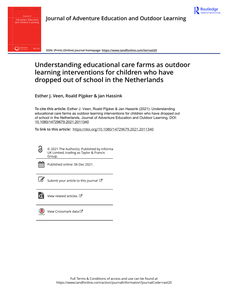The necessity for humans inhabiting the 21st century to slow down and take time to carry out daily practices frames the discourse of this research note. We suggest reconceptualising tourist wellbeing through the concept of slow adventure, as a response to the cult of speed and as a vehicle for engaging in deep, immersive and more meaningful experiences during journeys in the outdoors. We suggest that slow adventure has the potential to improve people’s general health and wellbeing through mindful enjoyment and consumption of the outdoor experience and thus bring people back to a state of mental and physical equilibrium. In so doing, we argue that extending the concept to include discussions around the psychological and social aspects of slow adventure is needed.
MULTIFILE
Against the backdrop of the United Nations’ Sustainable Development Goal 3, good health and wellbeing, this paper reports on a study that examined how outdoor guides perceive their role in facilitating the psychological wellbeing of tourists who consume slow adventure experiences. These experiences, such as canoeing, stargazing or foraging, are characterised by a slower passage of time, immersion in the natural world and a sense of belonging to small social groups. Grounded in research on wellbeing from a positive psychology perspective, the study utilised semi-structured, in-depth, interviews with ten outdoor adventure guides in the Scottish Highlands and Islands. Following a hermeneutic interpretive approach to analyse the interview transcripts, the findings revealed how perceptions of time, meaningful moments and a sense of togetherness are choreographed by slow adventure guides to shape tourists’ psychological wellbeing through immersive guided experiences, ultimately helping tourists to re-establish a much-yearned-for connection with nature. The study adds to tourism, wellbeing and sustainability literature by providing new perspectives on psychological wellbeing through guided slow adventures. In particular the findings contribute to positive tourism, or tourism and positive psychology field of research, by revealing how mindful and eudaimonic visitor experiences are organised by adventure tour guides in natural settings.
LINK
This article investigates the transformative impacts of regular nature-based adventure activity engagement and its long-lasting effects on eudaimonic well-being (EWB), specifically mental health. Although extant research highlights a wide range of well-being and mental health benefits from participation in such pursuits, less is known about experienced outdoor adventure enthusiasts for whom adventure is a fundamental and transformational part of their lives. The study builds on an existing conceptual framework that synthesizes pertinent research concepts on nature-based activity engagement and subjective well-being benefits. It presents key findings from 40 semi-structured in-depth online interviews with respondents from the UK, Germany, and Serbia. Interview data were collated and analyzed using a thematic framework approach. The findings highlight the importance of outdoor adventure activity engagement for respondents’ mental and physical health and long-term well-being. Regular activity participation can be transformational in reducing feelings of ill-being and enhancing EWB. It can improve self-efficacy and identity development and promote the fulfilment of psychological needs, facilitated by key transformational catalyzers. Continually entering a liminal state, experiencing emotions, and overcoming challenges and risks during engagement are crucial to “successful” long-lasting transformation. Further research should continue to explore adventure’s transformational and EWB benefits to develop long-term data.
DOCUMENT

When children drop out of school, either temporarily or permanently, this poses a significant problem for both children and society. In the Netherlands, care farms offering care-education programs for school dropouts are emerging. While there is evidence for their effectiveness, models explaining how such outdoor interventions may facilitate positive developments of children and their return to school are lacking. Using the generic Context-Intervention-Mechanisms-Outcome Model as an overarching deductive frame, this study inductively examines how care-educational programs facilitate the positive development of children who have dropped out of school.
DOCUMENT

Positioning paper bij de inauguratie van Vincent Voet als lector Circular Plastics.
DOCUMENT
![People. Planet. Polymer: een Wereld te Winnen [Inaugurele rede]](https://publinova-harvester-content-prod.s3.amazonaws.com/thumbnails/files/previews/pdf/20250506132442742072.Positioning20Paper20Vincent20Voet202024-thumbnail-400x300.png)
This article seeks to contribute to the literature on circular business model innovation in fashion retail. Our research question is which ‘model’—or combination of models—would be ideal as a business case crafting multiple value creation in small fashion retail. We focus on a qualitative, single in-depth case study—pop-up store KLEER—that we operated for a duration of three months in the Autumn of 2020. The shop served as a ‘testlab’ for action research to experiment with different business models around buying, swapping, and borrowing second-hand clothing. Adopting the Business Model Template (BMT) as a conceptual lens, we undertook a sensory ethnography which led to disclose three key strategies for circular business model innovation in fashion retail: Fashion-as-a-Service (F-a-a-S) instead of Product-as-a-Service (P-a-a-S) (1), Place-based value proposition (2) and Community as co-creator (3). Drawing on these findings, we reflect on ethnography in the context of a real pop-up store as methodological approach for business model experimentation. As a practical implication, we propose a tailor-made BMT for sustainable SME fashion retailers. Poldner K, Overdiek A, Evangelista A. Fashion-as-a-Service: Circular Business Model Innovation in Retail. Sustainability. 2022; 14(20):13273. https://doi.org/10.3390/su142013273
DOCUMENT

The first part of this paper provides a series of conceptual critiques to illustrate how the recent move to inaugurate a “post-nature” world works to vindicate anthropocentric perspectives and a techno-managerial approach to the environmental crisis. We contend with this premise and suggest that troubling nature has profound implications for education. In the second part, we provide case studies from nature-based programs in The Netherlands and Canada to demonstrate how anthropocentric thinking can be reinscribed even as we work towards “sustainability”. Despite the tenacity of human hubris and the advent of the Anthropocene, we suggest these troubled times are also rich with emerging “post-anthropocentric” perspectives and practices. As such we offer “rewilding” as a means to think about education that moves beyond the romantic vestiges of “Nature” without lapsing into delusions of human exceptionalism. http://dx.doi.org/10.13135/2384-8677/2334 https://www.linkedin.com/in/helenkopnina/
MULTIFILE
